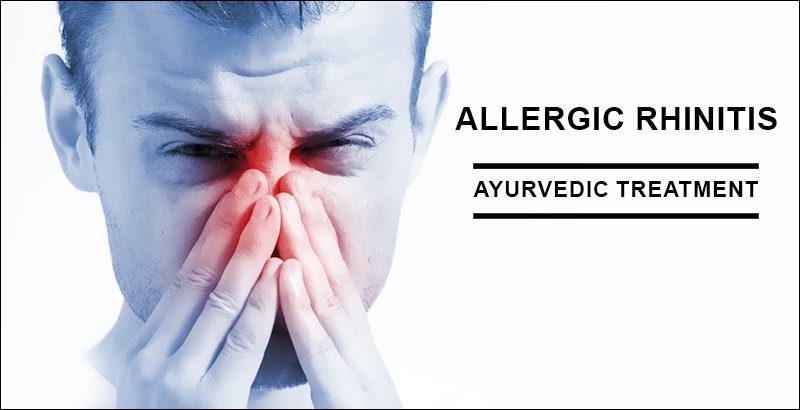Your search related to how to cure allergic rhinitis permanently, herbal remedies for allergic rhinitis, natural treatment for allergic rhinitis, and alternative treatment for allergic rhinitis ends here.
Let us introduce you to IAFA Ayurveda® which is one of the best Ayurvedic treatment centers in India, providing remedies for allergies worldwide.
What is Allergic Rhinitis?
Allergic Rhinitis is an IgE-mediated immunological response of the nasal mucosa to the air-borne allergens. Allergic rhinitis can be seasonal or perennial. It is commonly known as hay fever develops when the body’s immune system recognizes and overreacts to something in the environment that typically causes no problem in most of the people. Don’t be misled by the name as you don’t have to be exposed to hay to have symptoms.
Types of Allergic Rhinitis:
- Seasonal: The symptoms of seasonal allergic rhinitis can occur in spring season, early fall and summer. These are generally caused by allergic reaction to the airborne mold spores, pollen from trees, grass and weeds.
- Perennial: People suffering from perennial allergic rhinitis experience symptoms year-around. This is generally caused by dust mites, dander or pet hair, cockroaches or mold.
Some people may experience both types of rhinitis. The perennial symptoms get worse during specific pollen seasons.
Symptoms of Allergic Rhinitis
The symptoms are experienced after breathing in an allergy-causing substance such as pollen or dust. When a person who is sensitive to allergen inhales an allergen, the body’s immune system may react and produces the symptoms such as:
- Runny nose or postnasal drainage
- Stuffy nose due to blockage or congestion
- Itching in the nose, throat, mouth, or eyes
- Red and watery eyes
- Puffy and swollen eyelids
- Sneezing
- Cough
In children with allergic rhinitis, it is seen that they become more irritable and moodier during allergy season.
Treatment of Allergic Rhinitis
The first approach to manage allergic rhinitis is to avoid the allergens that trigger the symptoms but many allergens that trigger allergic rhinitis are airborne that most of the time cannot be avoided.
Modern treatment of allergic rhinitis involves the prescription of intranasal corticosteroids, antihistamines, decongestants, nasal sprays, leukotriene pathway inhibitors, immunotherapy in the form of allergy shots and sublingual tablets, etc. These medications in the long run can cause side effects such as sedation, chest tightness, palpitations, swelling, unusual bleeding or bruising, etc.
Concept of Allergic Rhinitis – According to Ayurveda
In Ayurveda, Allergic Rhinitis is compared with Vata-Kaphajpratishaya. The Ama, Asatmya, and virudhhahara also predict the allergic conditions and can be correlated with allergic rhinitis.
Ama (toxins) are produced due to impaired digestion. The formation of Ama affects the Rasa (lymph) and Rakta (blood) dhatus (tissues) leading to the manifestation of Pratishaya.
Wrong food combination Virudhh Ahara (wrong food combination) has antagonist properties. Wrong food combinations such as taking fish with milk, clarified butter with honey, ice-creams after night meals, fruit juices with milk etc. leads to allergy.
Ayurvedic Treatment for Allergic Rhinitis
The Ayurvedic treatment for Allergic Rhinitis is based on eliminating the root cause as Ayurveda believes that a disease recurs when the responsible doshas have not been eradicated completely. These doshas exist in the body in their dormant form and may give rise to the same disorder again when exposed to aggravating factors. After correcting the doshas, herbal remedies for allergic rhinitis are prescribed to improve respiratory immunity and strength of the upper respiratory tract. It involves shodhan (detoxification), shaman (pacification) and rasayana (rejuvenation therapy).
Aahar (Diet Recommendation) for Allergic Rhinitis according to Ayurveda:
- Prefer kaphanashak foods like legumes, soups, light food, lukewarm water, etc.
- Avoid taking dairy products.
- Avoid the intake of heavy, fermented food, food that is too hot and too cold, non-vegetarian food, fruits such as bananas should be avoided.
- Avoid alcohol and cold beverages.
- Avoid ice-creams, cakes, and desserts.
Vihar (Lifestyle Changes):
- Always prefer lukewarm water.
- Have a routine for morning walk in warm weather.
- Use a mask while going out.
- Exercise regularly.
- Regular inhalation of steam soothes the symptoms of congestion.
- Avoid over-exposure to hot sun-rays.
- Always prefer warm water baths.
- Rubbing with mint oil, pain balm oil or nilgiri oil on the chest helps in preventing the attack.
Some Yoga Poses that are Useful in Allergic Rhinitis are:
- Ardha Chakrasana
- Virabhadrasana
- Sarvangasana
- Setubandhasana
The natural treatment for allergic rhinitis treats the root cause of the problem with the help of herbal remedies. Thus, alternative treatment for allergic rhinitis is safe for the patients and cures the problem permanently without causing any side effects.
If more assistance is required, please book an appointment to consult Dr. Sahil Gupta (B.A.M.S., M.H.A.) and follow his guideline to cure allergic rhinitis permanently.








